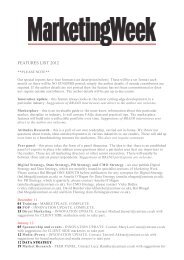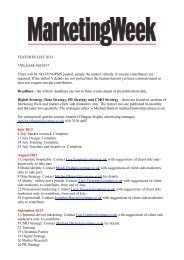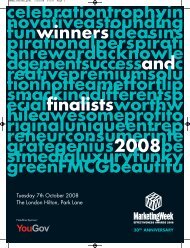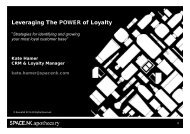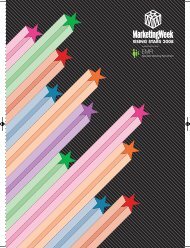Interactive Seven 2009 Supplement - Marketing Week
Interactive Seven 2009 Supplement - Marketing Week
Interactive Seven 2009 Supplement - Marketing Week
Create successful ePaper yourself
Turn your PDF publications into a flip-book with our unique Google optimized e-Paper software.
MWIB_260209_p047 19/2/09 17:56 Page 47<br />
INTERACTIVE CONVERGENCE<br />
The more the merrier<br />
Web marketing is commonly seen as either a tag-on to a campaign or as an<br />
independent force, but its true power lies in integration. By David Benady<br />
Metrotwin: BA’s New York/London social site<br />
At times, it looks as though brand<br />
marketing will go completely digital,<br />
and online will emerge supreme<br />
as the only communications channel<br />
worth considering. But for the time being, web<br />
marketers feel marginalised by brand owners<br />
when it comes to planning ad campaigns. They<br />
see web marketing as hastily bolted on after the<br />
TV ads, press campaigns, direct mail and sampling<br />
strategies are worked out.<br />
Moves by mobile phone and ISP brand<br />
Orange to shift all its marketing into digital<br />
media by 2012 are seen by some as an indication<br />
that web marketing will eventually steamroller<br />
all other forms of media. Orange’s brand<br />
director Justin Billingsley told a digital conference<br />
last year that digital advertising carries<br />
“a lot less risk” than costly TV campaigns.<br />
However, some reject the idea that successful<br />
marketing strategies can be pursued through<br />
any single medium. Antony Miller, Royal Mail<br />
head of media business development, sees integration<br />
becoming more important. “Marketers<br />
are beginning to see that rather than competing,<br />
online and offline messaging can support<br />
each other, adding value to a campaign,” he says,<br />
pointing to a recent Royal Mail study which<br />
shows that integrating digital marketing with<br />
direct mail can increase customer spend by 25%.<br />
Almost 70% of respondents in the study felt<br />
that email was more suitable for communicating<br />
shorter messages, or clarifying a message<br />
that has been received through the post. More<br />
than half also said they would prefer a company<br />
to approach them initially by post, then<br />
through email. “The more personal nature of<br />
direct mail creates a better initial impression,”<br />
says Miller.<br />
But there is a feeling that many brands have<br />
a long way to go before they take on board the<br />
full implications of the web for their wider marketing<br />
strategies. “Web marketing tends to be<br />
downstream, disconnected and peripheral to<br />
the main aim of the brand,” says Jason Gonsalvez,<br />
head of engagement planning at BBH.<br />
Most campaigns either simply amplify a TV<br />
idea or tack on the web campaign as an afterthought,<br />
he says. But he points to work the<br />
agency has done for BA in creating a social networking<br />
website called Metrotwin for people<br />
travelling between New York and London. It<br />
aims to put BA ahead, in the struggle for customers<br />
on the route, as competition heats up<br />
following Open Skies deregulation.<br />
The site offers reviews of restaurants, hotels,<br />
clubs and place of interest in both cities, as<br />
well as blogging and networking opportunities.<br />
It is tangential, but additional to offline<br />
marketing work. Gonsalvez sees this as an<br />
example of how online can add value to a<br />
brand’s marketing.<br />
“Online marketing is about<br />
recognising that consumers<br />
have elected to engage with<br />
you. From there you are<br />
pushing at an open door”<br />
Ben Langdon,<br />
Digital Media Group<br />
Recognition through content<br />
Other brands which are considered to successfully<br />
integrate their marketing across media<br />
include Red Bull and Nike. According to Kevin<br />
Allen, head of planning at Proximity London,<br />
both the sportswear and energy drink brands<br />
achieve strong recognition whichever medium<br />
they use, even though they do not stamp a single<br />
identity across all of their communications.<br />
“They think about content, and what type<br />
is best for a particular time and place that will<br />
create maximum engagement with their audience.<br />
If the answer is a TV ad then fine; but<br />
increasingly the answer seems to be an event<br />
or experience; it can happen primarily in the<br />
physical world, such as Red Bull’s Flugtag (a<br />
competition between home-made, human powered<br />
flying machines) or the way O2 is using the<br />
Millennium Dome,” he says.<br />
For some brands, online is simply another<br />
form of direct marketing using personalised<br />
communications and direct response. Ben Langdon,<br />
chief executive of Digital Media Group,<br />
says: “People misunderstand digital marketing.<br />
They think it is just about online video or websites,<br />
but they haven’t understood what is going<br />
on behind the scenes.”<br />
DMG attempts to take information gathered<br />
offline and apply it to web marketing. Langdon<br />
gives the example of work done for Thomas<br />
Cook Financial Services. People who have<br />
booked a holiday and paid a deposit are ripe for<br />
cross-selling and other promotions. One concept<br />
uses a “holiday countdown” where customers<br />
receive direct mail and emails before<br />
their holiday, directing them to a microsite<br />
where they can find out more about their destination<br />
and access a personalised holiday<br />
check-list. “Online marketing is about recognising<br />
that consumers have elected to engage<br />
with you. From there you are pushing at an open<br />
door,” says Langdon.<br />
The explosion of media channels has<br />
brought a plethora of choice. But choosing the<br />
most effective mix of media is still one of the<br />
greatest challenges brands face. Creative agency<br />
chiefs invariably argue that the key is to have<br />
a “big idea” that can work across all media. But<br />
if “the medium is the message”, as Marshall<br />
MacLuhan claimed, then surely each medium<br />
needs its own special bit of attention.<br />
Over the next few years it will become clear<br />
how traditional media will fare against the<br />
onslaught of digital and other emerging forms<br />
of brand building, such as experiential marketing.<br />
But it is clear that marketing communications<br />
will need to find new ways of<br />
delivering integrated messages to an ever more<br />
fragmented populus.<br />
<br />
<strong>Marketing</strong> <strong>Week</strong> <strong>Interactive</strong> 47



